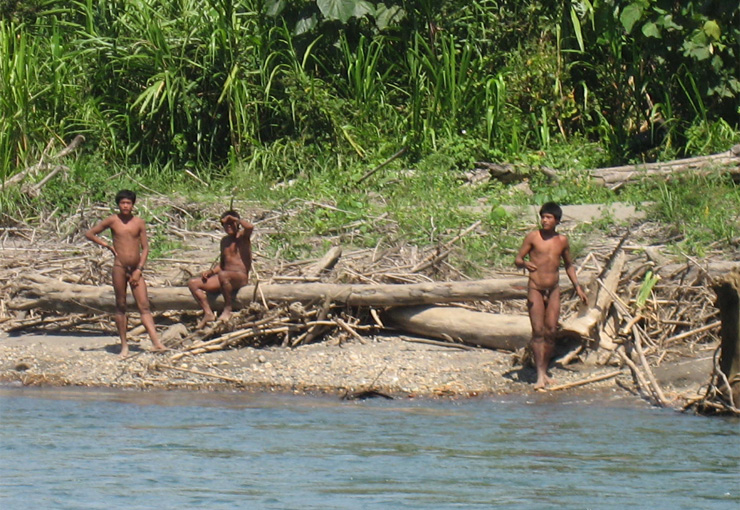Gold miners ‘massacred’ uncontacted Amazon tribe
Miners allegedly boasted of ‘cutting up’ at least ten indigenous people

A free daily email with the biggest news stories of the day – and the best features from TheWeek.com
You are now subscribed
Your newsletter sign-up was successful
Brazilian authorities have launched an investigation into a group of gold miners who allegedly boasted of killing members of an “uncontacted” Amazon tribe.
The miners are said to have told patrons in a bar near the Colombian border that it was “kill or be killed” when they came across a party of uncontacted tribespeople collecting eggs along a river bank in a remote part of Amazonas state last month.
Ten or more members of the indigenous group, including women and children, were reportedly killed in the “genocidal” attack, according to indigenous rights group Survival.
The Week
Escape your echo chamber. Get the facts behind the news, plus analysis from multiple perspectives.

Sign up for The Week's Free Newsletters
From our morning news briefing to a weekly Good News Newsletter, get the best of The Week delivered directly to your inbox.
From our morning news briefing to a weekly Good News Newsletter, get the best of The Week delivered directly to your inbox.
Leila Silvia Burger Sotto-Maior, a co-ordinator for Brazil’s indigenous affairs agency, Funai, said the miners “even bragged about cutting up the bodies and throwing them in the river”, the New York Times reports.
Witnesses interviewed by Funai said the men displayed a wooden paddle they claimed to have taken from the tribespeople, she said, describing the boast as “crude bar talk”.
The incident is said to have occurred in the Javari valley, a vast expanse of rainforest roughly the size of Azerbaijan.
One of Brazil’s designated indigenous territories, its 32,900 square miles are home to around 3,000 different peoples, of which 16 are thought to have had no formal contact with the outside world.
A free daily email with the biggest news stories of the day – and the best features from TheWeek.com
Funai is tasked with protecting remote tribes and their land from unwanted contact with outsiders, which brings with it the risk of deadly disease and economic exploitation by unauthorised loggers, miners and ranchers.
However, three of the five bases Funai operates in the Javari valley to ensure that remote tribes are allowed to live in “voluntary isolation” have been closed in recent years as a result of central government cuts, the New York Times reports.
Funai’s report into the alleged incident has been passed on to the Brazilian federal prosecutor’s office, which has now opened its own inquiry.
Lead prosecutor Pablo Luz de Betrand said that the office would do its best to investigate the reports, but warned: “the territories are big and access is limited”.
-
 6 exquisite homes with vast acreage
6 exquisite homes with vast acreageFeature Featuring an off-the-grid contemporary home in New Mexico and lakefront farmhouse in Massachusetts
-
 Film reviews: ‘Wuthering Heights,’ ‘Good Luck, Have Fun, Don’t Die,’ and ‘Sirat’
Film reviews: ‘Wuthering Heights,’ ‘Good Luck, Have Fun, Don’t Die,’ and ‘Sirat’Feature An inconvenient love torments a would-be couple, a gonzo time traveler seeks to save humanity from AI, and a father’s desperate search goes deeply sideways
-
 Political cartoons for February 16
Political cartoons for February 16Cartoons Monday’s political cartoons include President's Day, a valentine from the Epstein files, and more
-
 Epstein files topple law CEO, roil UK government
Epstein files topple law CEO, roil UK governmentSpeed Read Peter Mandelson, Britain’s former ambassador to the US, is caught up in the scandal
-
 Iran and US prepare to meet after skirmishes
Iran and US prepare to meet after skirmishesSpeed Read The incident comes amid heightened tensions in the Middle East
-
 Israel retrieves final hostage’s body from Gaza
Israel retrieves final hostage’s body from GazaSpeed Read The 24-year-old police officer was killed during the initial Hamas attack
-
 China’s Xi targets top general in growing purge
China’s Xi targets top general in growing purgeSpeed Read Zhang Youxia is being investigated over ‘grave violations’ of the law
-
 Panama and Canada are negotiating over a crucial copper mine
Panama and Canada are negotiating over a crucial copper mineIn the Spotlight Panama is set to make a final decision on the mine this summer
-
 Why Greenland’s natural resources are nearly impossible to mine
Why Greenland’s natural resources are nearly impossible to mineThe Explainer The country’s natural landscape makes the task extremely difficult
-
 Iran cuts internet as protests escalate
Iran cuts internet as protests escalateSpeed Reada Government buildings across the country have been set on fire
-
 US nabs ‘shadow’ tanker claimed by Russia
US nabs ‘shadow’ tanker claimed by RussiaSpeed Read The ship was one of two vessels seized by the US military